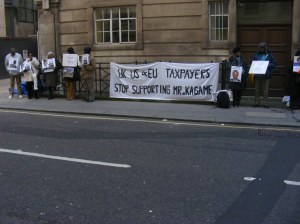In November this year an open letter/ petition was sent to Andrew Mitchell, UK Secretary of State for International Development, calling for immediate release of Ms Victoire Ingabire Umuhoza and other political prisoners, and a stop to impunity of Rwandan leaders for war crimes, crimes against humanity and acts of genocide. The petition highlighted the circumstances of imprisonment of the leader of FDU-Inkingi and the significance of the UN Mapping Report on atrocities committed in Democratic Republic of Congo. The document stressed as well the role that UK could play using its leverage power and help solve current stalemate of the Rwandan political situation.
Stephen O’Briean, Minister who leads on the issues raised by the petition replied on December 17th, 2010, on behalf of the Secretary of State. He explains what has been done and currently is being followed up closely. ‘In my discussions with the Rwandan Government, I regularly raise concerns about the tight controls they have placed on political rights and freedom of expression. I am following closely the legal proceedings against Ms Ingabire. It is my hope that the UN Mapping Report will be used constructively, and I am encouraging all parties to engage positively in the process.’
On the issue of human rights as daily experienced by Rwandans, the latter could be the only objective assessors of any impact of UK contribution and approach. It is quite certain they can confirm that from the Rwandan government side there has been no tangible restraint in its violations and abuses. On the contrary one could notice that UK apparent conciliatory and somehow biased attitude in favour of the regime may explain and justify Kigali’s intransigence.
 As the petition had as well raised the issue of effective use of UK taxpayers’ money, considered wide scale violations and abuses of human rights by the Rwandan government, Minister O’Brien contested such assessment. ‘I do not agree that the UK investment in Rwanda is delivering poor value for money. The Rwandan Government uses development finance well. Achievements include a 30% reduction in infant mortality in just over two years, from 86 per 1,000 live births in 2005 to 62 per 1,000 births in 2007/8, and 2006. Recently, the independent body Transparency International published its Corruption Perceptions Index, which highlights that Rwanda is among the least corrupt of African countries. These achievements are considered in providing UK development aid to Rwanda.’
As the petition had as well raised the issue of effective use of UK taxpayers’ money, considered wide scale violations and abuses of human rights by the Rwandan government, Minister O’Brien contested such assessment. ‘I do not agree that the UK investment in Rwanda is delivering poor value for money. The Rwandan Government uses development finance well. Achievements include a 30% reduction in infant mortality in just over two years, from 86 per 1,000 live births in 2005 to 62 per 1,000 births in 2007/8, and 2006. Recently, the independent body Transparency International published its Corruption Perceptions Index, which highlights that Rwanda is among the least corrupt of African countries. These achievements are considered in providing UK development aid to Rwanda.’It is strongly arguable that the figures represent the real picture for effective use of UK taxpayers’ money, knowing how the Rwandan government has along the years twisted facts and realities on the ground to project to the rest of world a trustworthy system. Without being exhaustive, it would be important to point to few events from 2010 to demonstrate that manipulative policy on the part of the Rwandan regime. Presidential elections of August 9th which were credited by Paul Kagame to be democratic while all opposition leaders were either in prison or denied participation. Myth of gender equality because Rwanda has the biggest number of women members of parliament, when they are only used by the regime as propaganda tools to serve its political interests. Rwandan women who are members of parliament, likewise its male members, don’t have any discretionary decision on government policies.
Time and again, the overall picture confirms the fact that the future that Rwandans will have depends on how they want to shape it. They will get what they deserve. If they want to continue being ruled by a dictatorial regime, they will be. A democratic political environment which for example enables to write these lines without fear of imprisonment would however be better suited to them. It would help them achieve more than they could imagine. But to get to that stage, it is hard work which demands a lot of sacrifices. These are indeed worth taking. On earth and in life there are no free lunches


1 comment:
allez sur mon site Chrome-Hearts Dolabuy conseils utiles Balenciaga Dolabuy recherchez-les https://www.dolabuy.ru/
Post a Comment